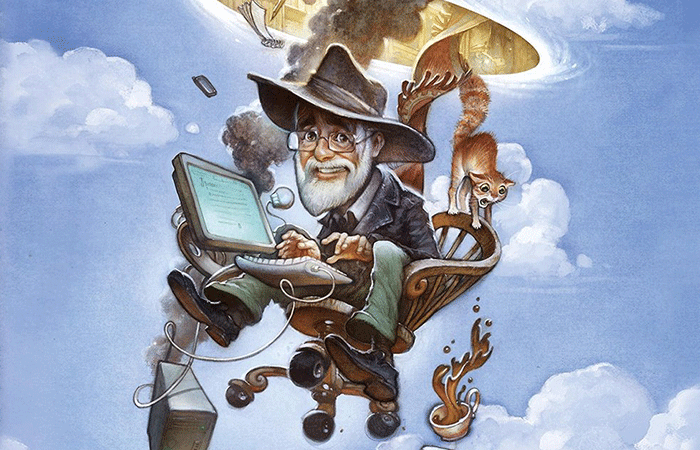Terry Pratchett, the Master of Mirthful Fantasy, Has Left the Disc

HUMANS NEED FANTASY TO BE HUMAN. TO BE THE PLACE WHERE THE FALLING ANGEL MEETS THE RISING APE.
– Death (Hogfather, by Terry Pratchett)
A veritable publishing institution, a British national treasure, beloved the world over, and a foundational fantasy writer of the modern era (if he wasn’t the giant turtle, he was for sure one of those four massive elephants), author Sir Terry Pratchett, the creator of Discworld, died today following a lengthy, public battle with Alzheimer’s disease. He was 66.
Famously the best-selling British author until one J.K. Rowling rolled around, Pratchett published more than 40 books in the Discworld universe (with number 41 forthcoming this year), and a host of other novels and short fictions, since launching his career in 1983 with The Colour of Magic. Unless you’ve been trapped inside a curiously animated piece of magical luggage for the last few decades, you know that Discworld, a flat disc (hence the name) balanced atop the backs of four elephants standing upon the shell of a giant turtle flying through the cosmos, was the remarkably fertile setting for a brilliantly expansive fantasy series that managed to be both a parody of, and a warm-hearted tribute to, Tolkien, fantasy tropes, sword-and-sorcery tales, ancient myth, and folklore, among other things.
Pratchett’s true brilliance was an ability to use fantasy as a lens through which to focus a laser of political and social satire. His greatest institution, the Discworld city of Ankh-Morpork, was as rife with corruption, incompetence, and absurdity as any real-world locale (ok, perhaps a bit more absurdity, if you count the simian librarian). His loose trilogy starring hapless schemer Moist von Lipwig, a petty criminal put in charge of various bits of unworkable government bureaucracy (from a flailing post office to an inefficient transportation system) is even funnier for sounding exactly true enough to explain why it just took you more than an entire lunch break to buy stamps.
For such a lengthy series, Discworld remained readily accessible to new readers throughout its three-decade existance, as Pratchett, never one for focusing his attention in one spot for too long, jumped between characters and plotlines, juggling genre tropes as he went. From the Night’s Watch books, hardboiled noir pastiches focused on Ankh-Morpork’s beleaguered (and totally disrespected) law enforcement, to the outsized bumbling of the wizard Rincewind, to unforgettably gruff old witches led by the tough Granny Weatherwax, even to a fantastic YA series starring one of the most loveably realistic teens in fantasy literature, Pratchett truly wrote at least one book for every different kind of reader (except the totally humorless ones, who would be rightly instructed to sod off).
Pratchett announced his diagnosis in December 2007, and for the last eight years, he never stopped fighting (for a cure, for the right to die on his own terms). He also never stopped writing, gifting us with yet more memorable trips back to the Disc, to a world where nothing makes sense, and that’s just the way we like it.